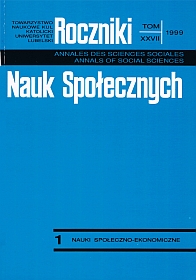Temporalność i rozumienie zjawisk społecznych. Koncepcja Roberta M. MacIvera
Abstrakt
Robert Morrison MacIver, the successor of Franklin H. Giddings at Columbia University, was a leading opponent of positivism (George Lundberg), empiricism (William Ogburn) and anti-theoretical praxism (Robert Lynd) in sociology. MacIver developed sociological theorizing according to Weber's tradition.
The text was focused around the questions of temporality taken up by MacIver: 1) the question of a separate qualitative time; 2) the question of different temporal varieties of existence in the social-cultural area; 3) temporality of social action.
MacIver, unnoticed by today's symbolic interactionists, tried to find implications of George H. Mead's work about time for analysis of action as dynamic transformation of the present. In MacIver's theorizing a unity of meaningful or symbolic and temporal aspects of social phenomena is obvious. MacIver's criticism of the methodology of social research focused on analysis of variables was in agreement with criticism of scientific mechanism offered by Bergson. He studied temporal varieties of existence of events, processes and cultural objects, and especially the various ways of entering time through society, history and culture. MacIver made temporality of action the basic and key problem. He should be considered a symbolic interactionist, like Florian Znaniecki and Pitirim Sorokin.
Bibliografia
Abel Th.: Journal of Thoughts and Events. Vol. I: July 1930 – March 1933. Mps, Rare Books and Manuscripts Collection, Columbia University.
Abell P. (1981): The Syntax of Social Life: The Theory and Method of Comparative Narratives. New York: Clarendon Press.
Bergson H. (1968): Durée et simultannéité. À propos de la théorie d'Einstein. Paris: Presses Universitaires de France.
Blumer H. (1956): Sociological Analysis and the Variable. „American Sociological Review” vol. 21 s.683-690.
Braudel F. (1986): Une leçon d'histoire de Fernand Braudel. Paris: Arthaud-Flammarion.
Denzin N. (1982): On Time and Mind. „Studies in Symbolic Interaction” vol. 4 s.35-44.
Descartes R. (1968): Meditation on First Philosophy in The Philosophical Works of Descartes. Tłum. E.S.Halden, G.P.Ross. Vol. 1.Cambridge.
Elias N. (1978): What Is Sociology. Tłum. S.Mennell, G.Morrissey. New York: Columbia University Press.
Elias N. (1987): Time: An Essay. Tłum. E.Jephcott. Oxford: Blackwell.
Eliot Th. S. (1981): Four Quartets. New York: Harcourt, Brace and Co.
Giddens A. (1981): Time and Space in Social Theory: Critical Remarks upon Functionalism. „Current Perspectives in Social Theory” vol. 2 s.3-13.
Grathoff R. (Red.) (1978): The Theory of Social Action: the Correspondence of Alfred Schutz and Talcott Parsons. Bloomington: Indiana University Press.
Gurvitch G. (1963): Social Structure and the Multiplicity of Times. W: E.Tiryakian (Red.): Sociological Theory, Values, and Sociocultural Change. London: The Free Press of Glencoe s.171-184.
Hałas E. (1991): The Humanistic Approach of Florian Znaniecki. W: H.Helle (Red.): Verstehen and Pragmatism. Frankfurt–New York: Peter Lang s.213-228.
Halbwachs M. (1975): Les cadres sociaux de la mémoire. New York: Arno Press.
Husserl E. (1991): On the Phenomenology of the Consciousness of Internal Time. Tłum. J.Barnett. Dordrecht−Boston: Kluwer Academic Publisher.
Ingarden R. (1964): Time and Modes of Being. Tłum. H.R.Michejda. Spriengfield, Ill.: Charles C.Thomas Publisher.
Luhmann N. (1982): The Differentiation of Society. Tłum. S.Holmes, Ch. Larmore. New York: Columbia University Press.
MacIver R. (1931): Society. Its Structure and Changes. New York: Ray Long & RichardR.Smith, Inc.
Maclver R. (1937): Society. An Introductory Analysis. New York: Rinehart and Co., Inc.
Maclver R. (1962): The Challennge of the Passing Years. My Encounter with Time. New York: Pocket Books, Inc.
Maclver R. (1964): Social Causation. New York: Harper & Row Publishers, Inc. (1wyd. 1942).
Maclver R. (1970): On Community, Society and Power. Chicago: The University of Chicago Press.
Maines D.R. (1987): The Significance of Temporality for the Development of Sociological Theory. „Sociological Quarterly”. Special Feature: Conceptions of Temporality in Sociological Theory vol. 28 nr3 s.303-312.
Nagel E. (1956): Logic Without Metaphysics. Glencoe, Ill.: The Free Press.
Poulet G. (1956): Studies in Human Time. Baltimore: The John Hopkins Press.
Ricoeur P. (1985): Temps et récit. Vol. 3.Paris: Editions du Seuil.
Ritzer G. (1990): Frontiers of Social Theory: The New Syntheses. New York.
Schutz A. (1962): Collected Papers. T.1: The Problem of Social Reality. The Hague: Martinus Nijhoff Publishers.
Schwartz B. (1974): Waiting, Exchange, and Power: the Distribution of Time in Social Systems. „American Journal of Sociology” vol. 79 s.841-871.
Sharron A. (1982): Dimensions of Time. „Studies in Symbolic Interaction” vol. 4 s.63-90.
Sherover Ch. M. (1975): The Human Experience of Time. The Development of Its Philosophic Meaning. New York: New York University Press.
Sorokin P. (1943): Sociocultural Causality, Space, Time. AStudy of Referential Principles of Sociology and Social Science. Durkham, NC: Duke University Press.
Sorokin P. (1947): Society, Culture, and Personality: Their Structure and Dynamics. New York: Harper & Brothers Publishers.
Strauss A. (1991): Creating Sociological Awareness. Collective Images and Symbolic Representations. New Brunswick: Transaction Publishers.
Tilly Ch. (1981): As Sociology Meets History. New York: Academic Press.
Weber M. (1949): The Methodology of the Social Sciences. E.A.Shils, H.A.Finch (red.). New York: The Free Press.
White H.C. (1992): Identity and Control. AStructural Theory of Social Action. Princeton: Princeton University Press.
Zerubbavel E. (1981): Hidden Rhytms: Schedules and Calendars. W: Social Life. Chicago: University of Chicago Press.
Zerubbavel E. (1987): The Language of Time: Toward aSemiotics of Temporality. „The Sociological Quarterly” 28 nr3 s.343-356.
Znaniecki F. (1919): Cultural Reality. Chicago: The University of Chicago Press.
Znaniecki F. (1925): The Laws of Social Psychology. Warszawa–New York: Gebethner &Wolf.
Znaniecki F. (1934): The Method of Social Psychology. New York: Rinehart and Co.,Inc.
Znaniecki F. (1936): Social Actions. New York: Farrar & Rinehart, Inc.
Znaniecki F. (1952): Cultural Sciences. Their Origin and Development. Urbana, Ill.: University of Illinois Press.
Copyright (c) 1999 Roczniki Nauk Społecznych

Utwór dostępny jest na licencji Creative Commons Uznanie autorstwa – Użycie niekomercyjne – Bez utworów zależnych 4.0 Międzynarodowe.


